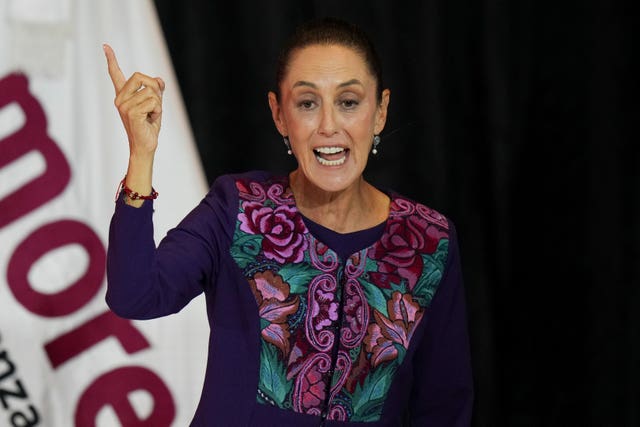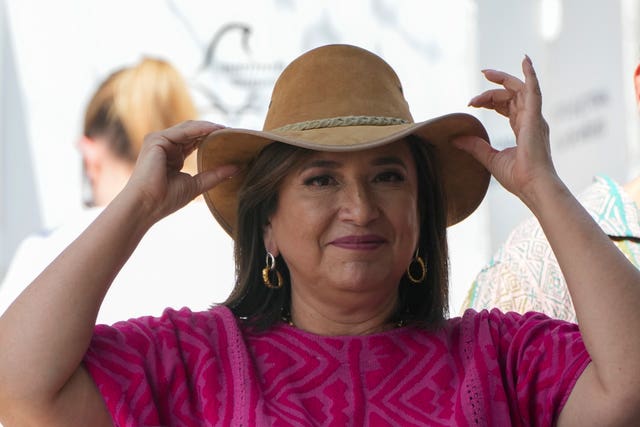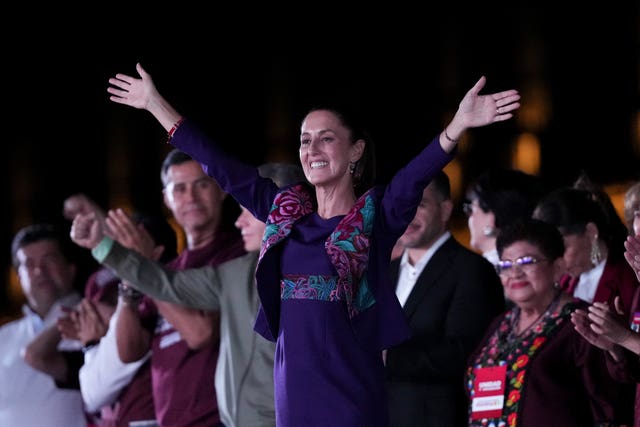Mexico’s projected presidential election winner Claudia Sheinbaum will become the first woman President in the country’s 200-year history.
Ms Sheinbaum said in Mexico City: “I will become the first woman president of Mexico,” shortly after electoral authorities announced a statistical sample that showed she holds an irreversible lead.
The climate scientist and former Mexico City mayor said her two competitors had called her to concede.
“We have demonstrated that Mexico is a democratic country with peaceful elections,” Ms Sheinbaum added.
Mexico’s National Electoral Institute said Ms Sheinbaum had between 58.3% and 60.7% of the vote, according to a statistical sample. Opposition candidate Xochitl Galvez had between 26.6% and 28.6% of the vote while Jorge Alvarez Maynez had between 9.9% and 10.8%.

The governing party candidate campaigned on continuing the political course set over the last six years by her political mentor, President Andres Manuel Lopez Obrador.
His anointed successor, the 61-year-old Ms Sheinbaum led the campaign throughout despite a spirited challenge from Ms Galvez. This was the first time in Mexico that the two main opponents in the presidential contest were women.
“Of course, I congratulate Claudia Sheinbaum with all my respect who ended up the winner by a wide margin,” Mr Lopez Obrador said shortly after electoral authorities’ announcement.

“She is going to be Mexico’s first (woman) president in 200 years.”
If the margin holds, it would approach his landslide victory in 2018. Mr Lopez Obrador won the presidency after two unsuccessful attempts with 53.2% of the vote, in a three-way race where National Action took 22.3% and the Institutional Revolutionary Party took 16.5%.
Earlier, Ms Galvez wrote on the social platform X: “The votes are there. Don’t let them hide them.”
Ms Sheinbaum is unlikely to enjoy the kind of unquestioning devotion that Mr Lopez Obrador has enjoyed. Both belong to the governing Morena party.
In Mexico City’s main colonial-era main plaza, the Zocalo, Ms Sheinbaum’s lead did not initially draw the kind of cheering, jubilant crowds that greeted Mr Lopez Obrador’s victory in 2018.

The main opposition candidate, Ms Galvez, a tech entrepreneur and former senator, tried to seize on Mexicans’ concerns about security and promised to take a more aggressive approach toward organised crime.
Nearly 100 million people were registered to vote, but turnout appeared to be slightly lower than in past elections.
Voters were also electing governors in nine of the country’s 32 states, and choosing candidates for both houses of congress, thousands of mayorships and other local posts, in the biggest elections the nation has seen – and ones that have been marked by violence.
The elections were widely seen as a referendum on Mr Lopez Obrador, a populist who has expanded social programmes but largely failed to reduce cartel violence in Mexico.
His Morena party currently holds 23 of the 32 governorships and a simple majority of seats in both houses of congress. Mexico’s constitution prohibits the president’s re-election.
Ms Sheinbaum promised to continue all of Mr Lopez Obrador’s policies, including a universal pension for the elderly and a programme that pays youths to take part in apprenticeships.




Comments: Our rules
We want our comments to be a lively and valuable part of our community - a place where readers can debate and engage with the most important local issues. The ability to comment on our stories is a privilege, not a right, however, and that privilege may be withdrawn if it is abused or misused.
Please report any comments that break our rules.
Read the rules here